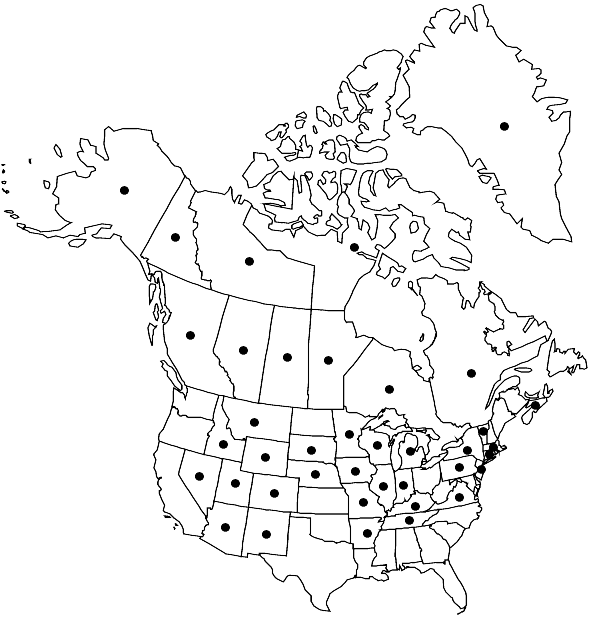Difference between revisions of "Timmia megapolitana"
Sp. Musc. Frond., 176. 1801,.
FNA>Volume Importer |
FNA>Volume Importer |
(No difference)
| |
Revision as of 19:38, 24 September 2019
Plants without deciduous distal leaves. Leaf apex acute; costa subpercurrent; sheath clear or yellowish; limb green, pellucid; limb-sheath transition abrupt, not sharply angled; limb margins strongly dentate in distal half, with fewer and smaller teeth below, and a few small sharp teeth at limb-sheath transition; limb lamina cells (5–)7–16(–21) × (6–)7–12(–14) µm, with low rounded or flattened mamillae on the adaxial surface, abaxial surface smooth; abaxial surfaces of sheath lamina cells smooth or with 1–6 papillae over lumen; cells at leaf insertion not fragile and hyaline; abaxial surface of limb costa smooth (rarely papillose near leaf apex), adaxial cells with rounded or somewhat flattened mamillae. Sexual condition monoicous; perichaetial leaves narrower than vegetative leaves. Calyptra with a median longitudinal split, sometimes persistent on the neck of the capsule or seta. Capsule plicate or puckered when dry; exothecial cells with non-sinuose walls; stomata on urn; endostome cilia with numerous spine-like or branched-stellate appendiculations on the interior surfaces.
Distribution

North America, Eurasia, n Africa, Atlantic Islands (Iceland), Pacific Islands (Hawaii).
Discussion
Subspecies 2 (2 in the flora).
Timmia megapolitana is a distinct species within the genus, separated by its monoicous sexuality, distinct but pale leaf sheaths, and elaborately appendiculate endostome cilia.
Selected References
None.
Key
| 1 | Cells of mid-limb lamina (8-)9-12(-14) µm wide; cells of distal part of leaf sheath papillose; calyptra often remaining attached to seta at base of capsule | Timmia megapolitana subsp. megapolitana |
| 1 | Cells of the mid-limb lamina (6-)7-10(-12) µm wide; cells of distal part of leaf sheath smooth; calyptra not persistent on seta. | Timmia megapolitana subsp. bavarica |